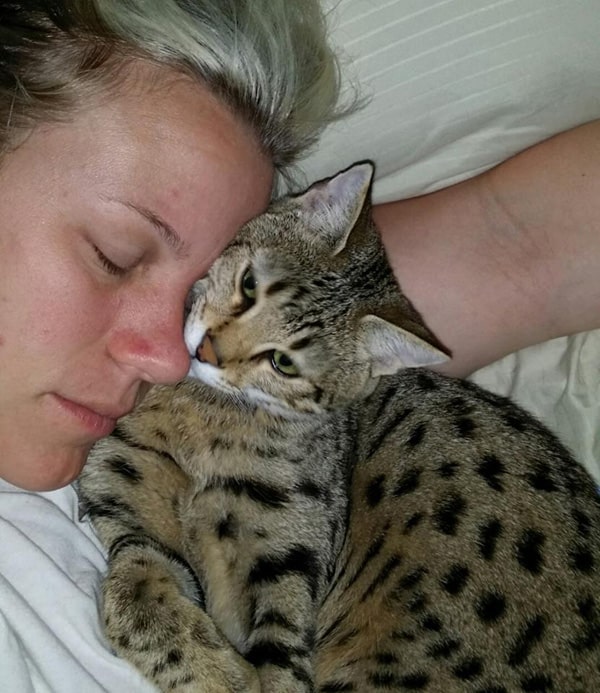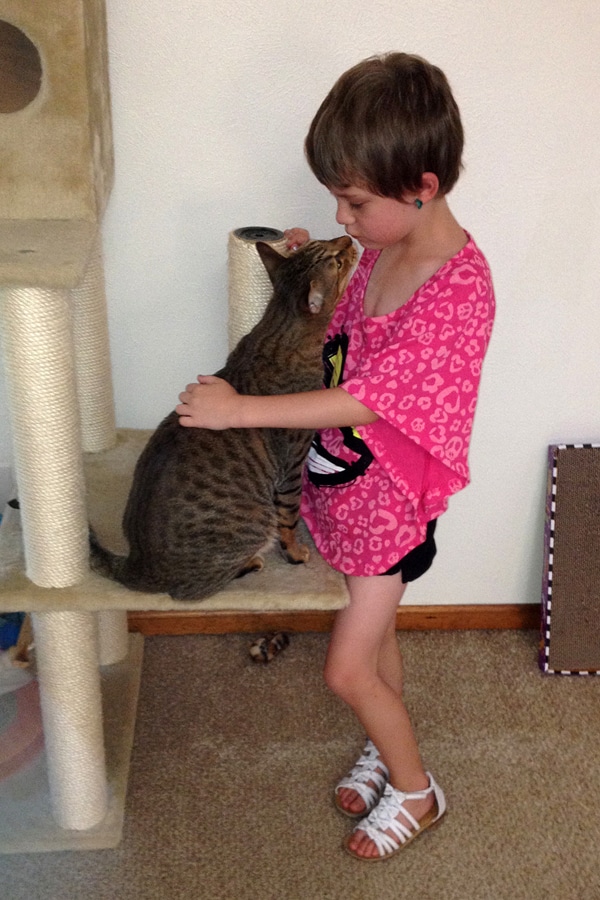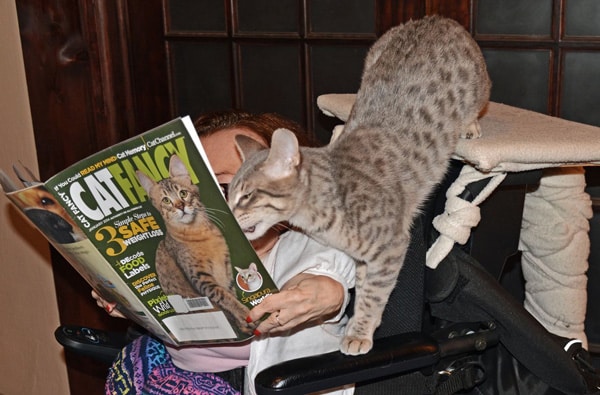Does the cat in the photo below look like one who is "too rough to live with domestic cats and dogs" or one who is “not safe to be around elderly people or children”? Some special interest groups think so.
Bengals, Savannahs, Chausies, and other domestic hybrid-derived cats are beautiful, active, and intelligent, and they make affectionate companions. Unfortunately, their specialness has made them the focus of controversy.

According to a petition submitted to the California Department of Fish and Wildlife, the state Fish and Game Commission, and the state Department of Food and Agriculture, Bengals, Savannahs, Chausies and other domestic hybrid-derived cats should be banned from California. It states that they have more litter box and aggression issues than other domestic cat breeds and that they "have an aversion to interaction with humans, frequent urine marking, and the inability to integrate into domestic settings." The authors of the petition, submitted by the Animal Legal Defense Fund and several cat sanctuaries, also allege that these cats "threaten human health and safety" and "certain Bengals can rip you to ribbons."
Nothing is further from the truth.

These domestic cat breeds have no more behavior problems than other cat breeds. I can prove it. I analyzed and collected data from three years of cat behavior consultations, focusing on the two main behavior problems repeatedly mentioned in the petition — litter box and aggression.
The 2011-2013 data placed Bengals and Savannahs in the middle — in other words, average. Other domestic breeds showed more aggression and litter box issues than Bengals and Savannahs. This is amazing, especially when factoring in their immense popularity.
According to The International Cat Association, the world’s largest registry of pedigreed cats, Bengals are one of the most popular breeds, with 103,593 registered with the organization. Additionally, there are 9,799 Savannahs and 1,237 Chausies registered with TICA.
In 2007 I also conducted a survey of different breed-specific rescues to determine the reasons cats were surrendered and abandoned. The results showed that the other rescue groups had more cats surrendered to them for behavior problems than the Bengal rescue group, and that the other groups had more cats that could not be rehabilitated than the Bengal group had. The complete study and article was published in the September, 2007 issue of Tufts University, Catnip.
Contrary to what the petitioners would like you to believe, they are not wild, temperamental, untamable, or more predisposed to behavior problems. As with all cats, there are many factors that can impact an individual cat’s behavior throughout life. Along with the environment and personal histories, the way people interact with the cats affects how they behave.

Bengals, Savannahs, and Chausies are special. Descriptive words that capture their essence are: intelligent, loving, entertaining, athletic, vivacious, and fun. Below are several reasons these cats should not be banned in California.
They make great companions
These lovely kitties are affectionate and wonderful companions. They form strong bonds with their people and want to be with them whenever possible. They’re not known as lap cats; some will hang out on laps, but only when they don’t have more pressing things on their agenda.
Friendships are not always limited to people. Many of these beauties enjoy the company of other resident animals as well.

They are intelligent
These cats are very smart and full of personality. Like all intelligent felines, without mental stimulation, they become bored. Most are attention seekers, looking for ways to interact with their favorite people. It is not uncommon for them to quickly figure out how to open doors and drawers. Some enjoy absconding with pens and other items, securing them in hard-to-reach places.
As with all cats, mental stimulation is obligatory. Interactive toys, puzzle boxes, and places to explore and climb help keep them entertained and happy. A fun way to showcase their intelligence is through clicker training. It does not take long to teach them to sit, shake hands, and perform other behaviors.

They are active
Bengals, Savannahs, and Chausies are the athletes of the cat world. Most of their waking hours are spent in action — climbing, jumping, running, and exploring. Because they love hanging out in high places, vertical territory is mandatory. The more shelves and cat trees, the better. Many enjoy fetching, and they love having enthusiastic play sessions with their favorite people.

These cats are among the breeds who have an affinity for water. Some enjoy showering with their people. Most love playing in running water and drinking from water faucets. Toilets and sinks sometimes double as perfect toy repositories.
Living with these energetic kitties is very rewarding and entertaining, but it does take commitment and lots of interaction.

Ancestry is no reason for a ban
The groups that want to ban Bengals, Savannahs, Chausies, and other domestic hybrid-derived cats also base their argument on ancestry. These cats are domestic cats who have wild-cat ancestors. Bengals were originally developed by crossing an Asian Leopard Cat (a small, nonaggressive wild cat) with a domestic cat. Savannahs are descended from African Servals and domestic cats. Chausies, meanwhile, have jungle cat and domestic ancestors. The majority of these kitties, who live in households, are at least four generations away from the wild-cat ancestor. They are beautiful cats who retain the wild look, but not the wild behavior.

Before adopting, do your homework
Potential adopters should thoroughly research the breeds they are interested in before adopting one or more. This applies to all cat breeds. Some breeds are vocal and may not be ideal for apartment living. Others are high maintenance, and need to be brushed every day. Bengals, Savannahs, and Chausies are very active and thrive on attention and companionship. They aren’t the right choices for everyone, especially people who don’t spend much time at home or people looking for calm cats who would rather nap than play.
Unfortunately, Bengals, Savannahs, Chausies, and other domestic hybrid-derived cats are sometimes adopted for the wrong reason — their wild, exotic looks. The adopters are not prepared for highly active, intelligent cats who thrive on attention and stimulation. These cats are perfect choices for households with people who love interacting with smart, high energy cats who love attention.

Make your opinion known
If you would like to voice your opposition to banning these beautiful cats, contact the California Fish and Game Commission, the California Department of Fish and Wildlife, and the California Department of Food and Agriculture via phone, fax, surface mail, or email. E-mail addresses for the heads of those organizations are as follows:
You can also sign this petition opposing the proposed ban.
Got a cat behavior question for Marilyn? Ask our behaviorist in the comments below and you might be featured in an upcoming column. If you suspect a behavioral problem, always rule out any possible medical issues that may be causing the behavior by first having your cat examined by a veterinarian. Marilyn can also help you resolve cat behavior challenges through a consultation.
Marilyn, a certified cat behavior consultant, owner of The Cat Coach, LLC, solves cat behavior problems nationally and internationally through on site, Skype and phone consultations. She uses force free methods that include environmental changes, management, clicker training and other behavior modification techniques.
She is also an award winning author. Her book Naughty No More! focuses on solving cat behavior problems through clicker training and other force-free methods. Marilyn is big on educationÔÇöshe feels it is important for cat parents to know the reasons behind their cat’s behaviors. She is a frequent guest on television and radio, answering cat behavior questions and helping people understand their cats.
Understand your cat better with these articles from Catster:
Why Cat Breeds Like the Bengal, Savannah and Chausie Have No Business Being Banned
Does the cat in the photo below look like one who is "too rough to live with domestic cats and dogs" or one who is “not safe to be around elderly people or children”? Some special interest groups think so.
Bengals, Savannahs, Chausies, and other domestic hybrid-derived cats are beautiful, active, and intelligent, and they make affectionate companions. Unfortunately, their specialness has made them the focus of controversy.
According to a petition submitted to the California Department of Fish and Wildlife, the state Fish and Game Commission, and the state Department of Food and Agriculture, Bengals, Savannahs, Chausies and other domestic hybrid-derived cats should be banned from California. It states that they have more litter box and aggression issues than other domestic cat breeds and that they "have an aversion to interaction with humans, frequent urine marking, and the inability to integrate into domestic settings." The authors of the petition, submitted by the Animal Legal Defense Fund and several cat sanctuaries, also allege that these cats "threaten human health and safety" and "certain Bengals can rip you to ribbons."
Nothing is further from the truth.
These domestic cat breeds have no more behavior problems than other cat breeds. I can prove it. I analyzed and collected data from three years of cat behavior consultations, focusing on the two main behavior problems repeatedly mentioned in the petition — litter box and aggression.
The 2011-2013 data placed Bengals and Savannahs in the middle — in other words, average. Other domestic breeds showed more aggression and litter box issues than Bengals and Savannahs. This is amazing, especially when factoring in their immense popularity.
According to The International Cat Association, the world’s largest registry of pedigreed cats, Bengals are one of the most popular breeds, with 103,593 registered with the organization. Additionally, there are 9,799 Savannahs and 1,237 Chausies registered with TICA.
In 2007 I also conducted a survey of different breed-specific rescues to determine the reasons cats were surrendered and abandoned. The results showed that the other rescue groups had more cats surrendered to them for behavior problems than the Bengal rescue group, and that the other groups had more cats that could not be rehabilitated than the Bengal group had. The complete study and article was published in the September, 2007 issue of Tufts University, Catnip.
Contrary to what the petitioners would like you to believe, they are not wild, temperamental, untamable, or more predisposed to behavior problems. As with all cats, there are many factors that can impact an individual cat’s behavior throughout life. Along with the environment and personal histories, the way people interact with the cats affects how they behave.
Bengals, Savannahs, and Chausies are special. Descriptive words that capture their essence are: intelligent, loving, entertaining, athletic, vivacious, and fun. Below are several reasons these cats should not be banned in California.
They make great companions
These lovely kitties are affectionate and wonderful companions. They form strong bonds with their people and want to be with them whenever possible. They’re not known as lap cats; some will hang out on laps, but only when they don’t have more pressing things on their agenda.
Friendships are not always limited to people. Many of these beauties enjoy the company of other resident animals as well.
They are intelligent
These cats are very smart and full of personality. Like all intelligent felines, without mental stimulation, they become bored. Most are attention seekers, looking for ways to interact with their favorite people. It is not uncommon for them to quickly figure out how to open doors and drawers. Some enjoy absconding with pens and other items, securing them in hard-to-reach places.
As with all cats, mental stimulation is obligatory. Interactive toys, puzzle boxes, and places to explore and climb help keep them entertained and happy. A fun way to showcase their intelligence is through clicker training. It does not take long to teach them to sit, shake hands, and perform other behaviors.
They are active
Bengals, Savannahs, and Chausies are the athletes of the cat world. Most of their waking hours are spent in action — climbing, jumping, running, and exploring. Because they love hanging out in high places, vertical territory is mandatory. The more shelves and cat trees, the better. Many enjoy fetching, and they love having enthusiastic play sessions with their favorite people.
These cats are among the breeds who have an affinity for water. Some enjoy showering with their people. Most love playing in running water and drinking from water faucets. Toilets and sinks sometimes double as perfect toy repositories.
Living with these energetic kitties is very rewarding and entertaining, but it does take commitment and lots of interaction.
Ancestry is no reason for a ban
The groups that want to ban Bengals, Savannahs, Chausies, and other domestic hybrid-derived cats also base their argument on ancestry. These cats are domestic cats who have wild-cat ancestors. Bengals were originally developed by crossing an Asian Leopard Cat (a small, nonaggressive wild cat) with a domestic cat. Savannahs are descended from African Servals and domestic cats. Chausies, meanwhile, have jungle cat and domestic ancestors. The majority of these kitties, who live in households, are at least four generations away from the wild-cat ancestor. They are beautiful cats who retain the wild look, but not the wild behavior.
Before adopting, do your homework
Potential adopters should thoroughly research the breeds they are interested in before adopting one or more. This applies to all cat breeds. Some breeds are vocal and may not be ideal for apartment living. Others are high maintenance, and need to be brushed every day. Bengals, Savannahs, and Chausies are very active and thrive on attention and companionship. They aren’t the right choices for everyone, especially people who don’t spend much time at home or people looking for calm cats who would rather nap than play.
Unfortunately, Bengals, Savannahs, Chausies, and other domestic hybrid-derived cats are sometimes adopted for the wrong reason — their wild, exotic looks. The adopters are not prepared for highly active, intelligent cats who thrive on attention and stimulation. These cats are perfect choices for households with people who love interacting with smart, high energy cats who love attention.
Make your opinion known
If you would like to voice your opposition to banning these beautiful cats, contact the California Fish and Game Commission, the California Department of Fish and Wildlife, and the California Department of Food and Agriculture via phone, fax, surface mail, or email. E-mail addresses for the heads of those organizations are as follows:
You can also sign this petition opposing the proposed ban.
Got a cat behavior question for Marilyn? Ask our behaviorist in the comments below and you might be featured in an upcoming column. If you suspect a behavioral problem, always rule out any possible medical issues that may be causing the behavior by first having your cat examined by a veterinarian. Marilyn can also help you resolve cat behavior challenges through a consultation.
Marilyn, a certified cat behavior consultant, owner of The Cat Coach, LLC, solves cat behavior problems nationally and internationally through on site, Skype and phone consultations. She uses force free methods that include environmental changes, management, clicker training and other behavior modification techniques.
She is also an award winning author. Her book Naughty No More! focuses on solving cat behavior problems through clicker training and other force-free methods. Marilyn is big on educationÔÇöshe feels it is important for cat parents to know the reasons behind their cat’s behaviors. She is a frequent guest on television and radio, answering cat behavior questions and helping people understand their cats.
Understand your cat better with these articles from Catster:
About the Author
Marilyn Krieger
Get Catster in your inbox!
Stay informed! Get tips and exclusive deals.
Current Issue
catstermag
1,250
Nov 2
Nov 1
Oct 31
Oct 30
Related
2023 Cat Photo Contest Winners
Best Buddies for Life
Follow Patches’ Ameowzing Weight Loss Journey
Follow Us